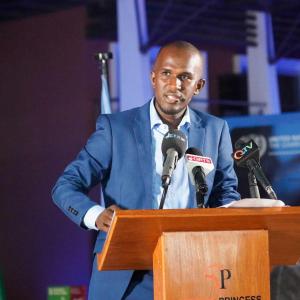The Gambia government and UN launch new initiative to empower adolescent girls and young people.
06 July 2022
New Initiative to Empower Adolescent Girls and young people.
Banjul, 06 July 2022 -
The government and the United Nations in The Gambia are launching a new initiative that responds to high HIV rates among adolescent girls and young women. Education Plus Initiative will be launched by the First Lady of The Gambia, H.E Fatoumata Bah Barrow, at the Sir Dawda Kairaba Jawara International Conference Center on July 07, 2022. Education Plus is a five-year high-level drive to accelerate action and investments to expand access to quality secondary education for all girls and boys and advance adolescent girls’ and young women’s health, education, and rights in The Gambia.
Completing secondary education, an urgent concern in the COVID-19 context, is a right in and of itself. Evidence shows it significantly contributes to reducing HIV among adolescent girls and young women—with drops in new cases of HIV by as much as one-third to one-half in some countries. Besides reducing vulnerability to acquiring HIV, girls, their communities, and countries reap multiple social and economic benefits from their completion of secondary school through the reduced likelihood of child marriage and teenage mothers, increased prospects for securing jobs and higher income and boosting national GDP, among others.
The Education Plus Initiative leverages the education system as an entry point to provide a holistic “plus” package of essential elements that adolescent girls and young women need as they become adults. These include comprehensive health education, sexual and reproductive health and rights, HIV prevention, freedom from sexual and gender-based violence, economic security, and empowerment through school-to-work transitions. Although The Gambia has made great strides towards gender equality and HIV prevention, many barriers persist.
In The Gambia, only 48% of adolescent girls complete lower secondary education, while only 30% complete upper secondary education (UIS, 2020). In 2020, more than half (55%) of the estimated 27 000 people living with HIV in The Gambia were females aged 15 years and above. Among young people aged 15-24, three out of four new HIV infections were in females. Comprehensive knowledge about HIV and AIDS prevention remains low among young people. It is estimated that 75% of adolescent girls and young women and 68% of adolescent boys and young men aged 15–24 years do not have knowledge of HIV prevention. While women and girls are biologically more susceptible to HIV than men and boys, unequal gender power dynamics and harmful gender norms are the root cause, compounded by intersecting forms of discrimination.
Child marriage prevents many adolescent girls from pursuing education and exposes them to gendered inequalities and violence. A quarter (23%) of young women aged 20-24 in The Gambia were married before 18 years (DHS 2019-20). Adolescent girls and young women face multiple forms of gender-based and sexual violence, including in schools and from intimate partners. Adolescent girls and young women’s decision-making power is key to their access to sexual and reproductive health rights and services, yet less than half (40%) of adolescent girls and women aged 15–49 years in The Gambia can make decisions concerning their Sexual Reproductive Health and Rights. Harmful practices such as female genital mutilation affect many adolescent girls and young women in The Gambia, with 75% of all adolescent girls and young women aged 15–19 years having undergone female genital mutilation (that, is three out of every four adolescent girls and women).
Education Plus advocates for gender-responsive reforms in policies, laws, and practices to guarantee the education, health, and other social and economic rights of adolescent girls and young people. This includes changes in parental consent requirements and eliminating user fees for adolescents to access basic HIV and other sexual and reproductive health services, supporting pregnant adolescents and young mothers to complete their education, and tackling gender-based violence, menstrual hygiene management, and mental health, among others.
The initiative also galvanizes partners to address structural barriers to young women’s effective school-to-work transitions, skilling, and training. Structural gendered inequalities have only been exacerbated during the COVID-19 pandemic and threaten to roll back gains on their rights and gender equality. Through the Education Plus Initiative, government and partners will commit to step-up policies and investments that work best, not only for adolescent girls and young women but for communities and the country. Young women’s participation is central to the initiative.
With the launch, The Gambia joins eight other African countries to be a champion for the Education Plus Initiative. The UN system in The Gambia is a key partner and supporter of domestic resource mobilization efforts and young women’s participation to ensure that Education Plus delivers for young people. The launch will bring together representatives from relevant government ministries, United Nations agencies, educators, teacher-parent associations, communities and leaders, and young people in The Gambia.










